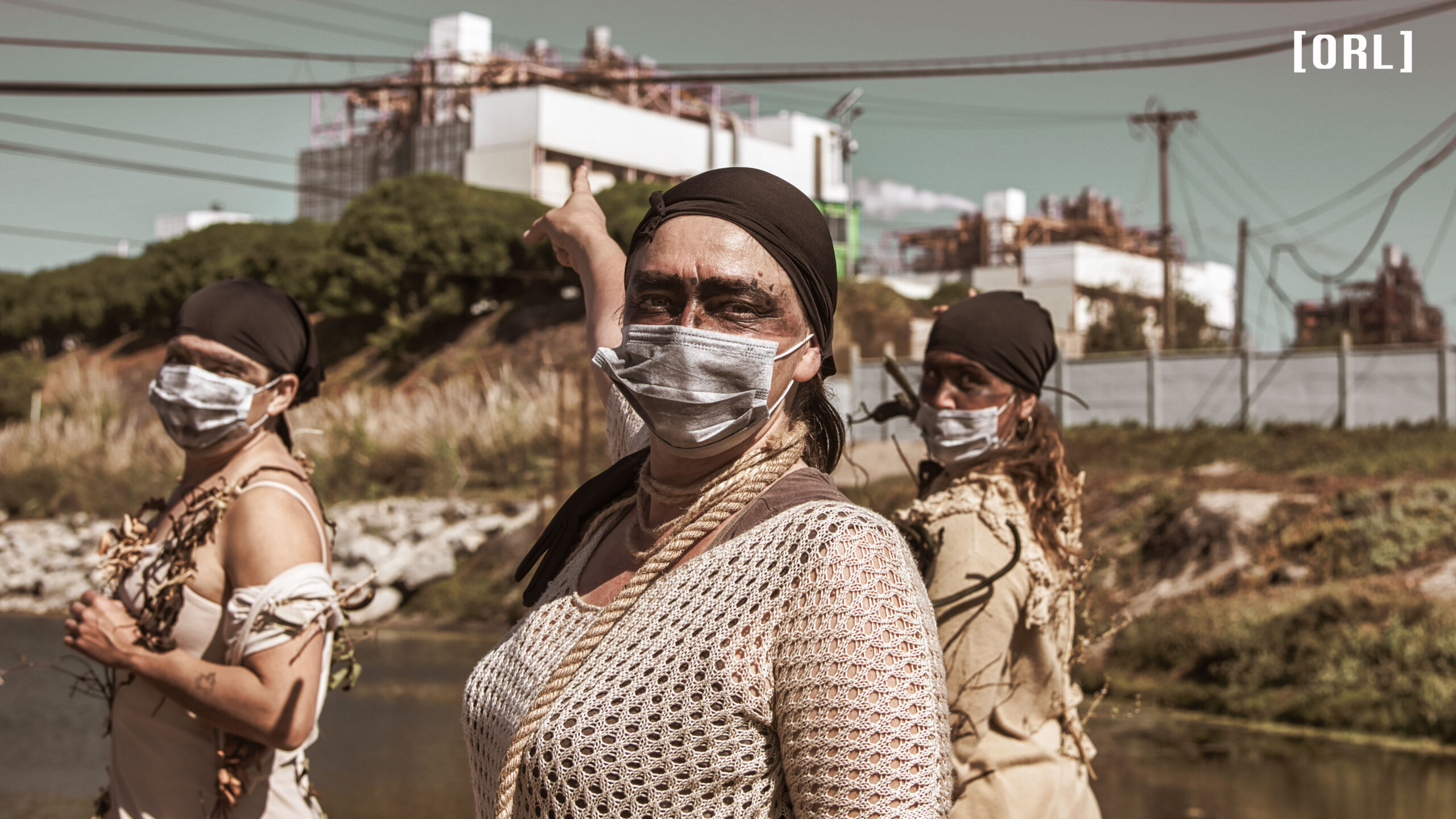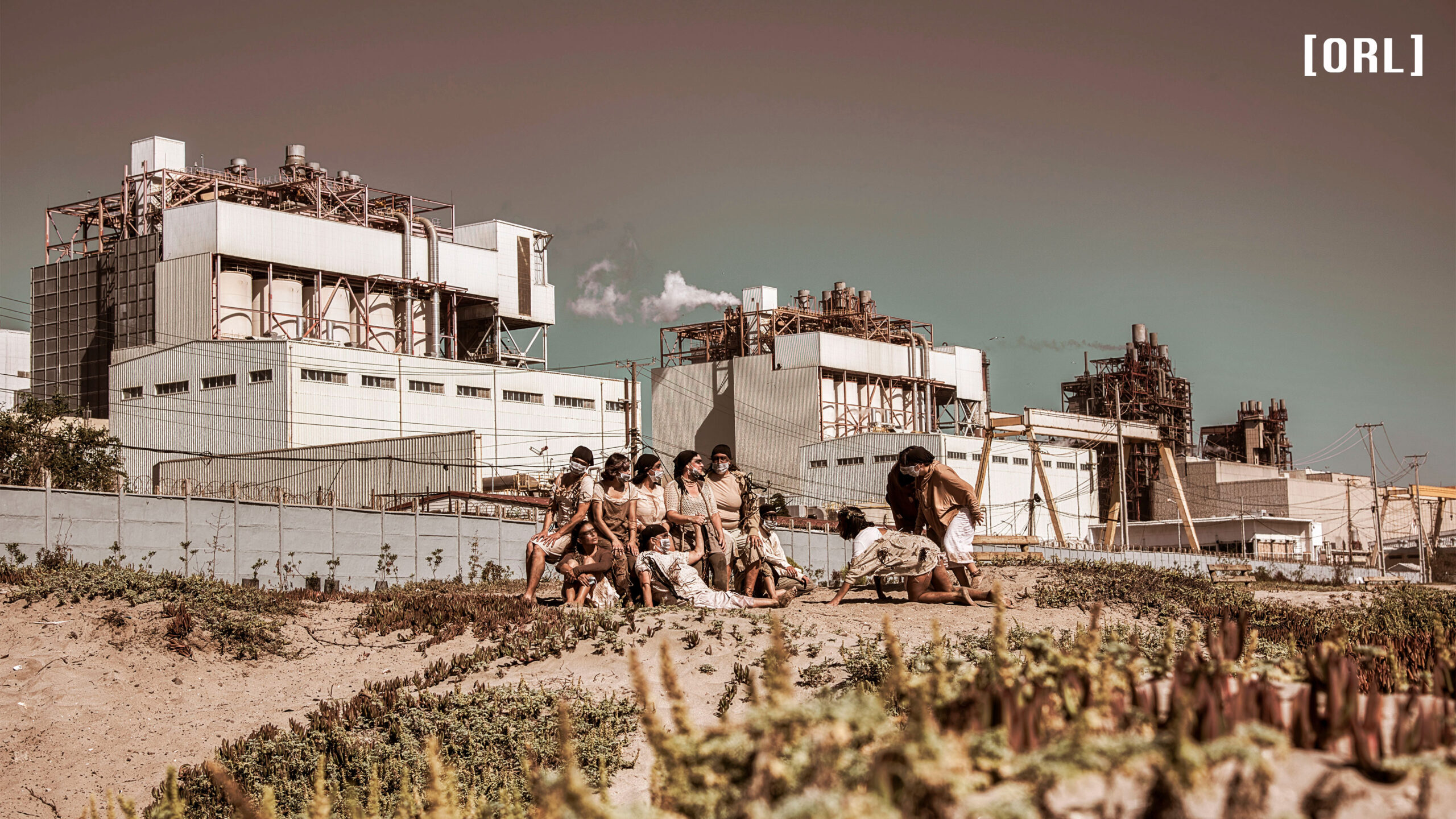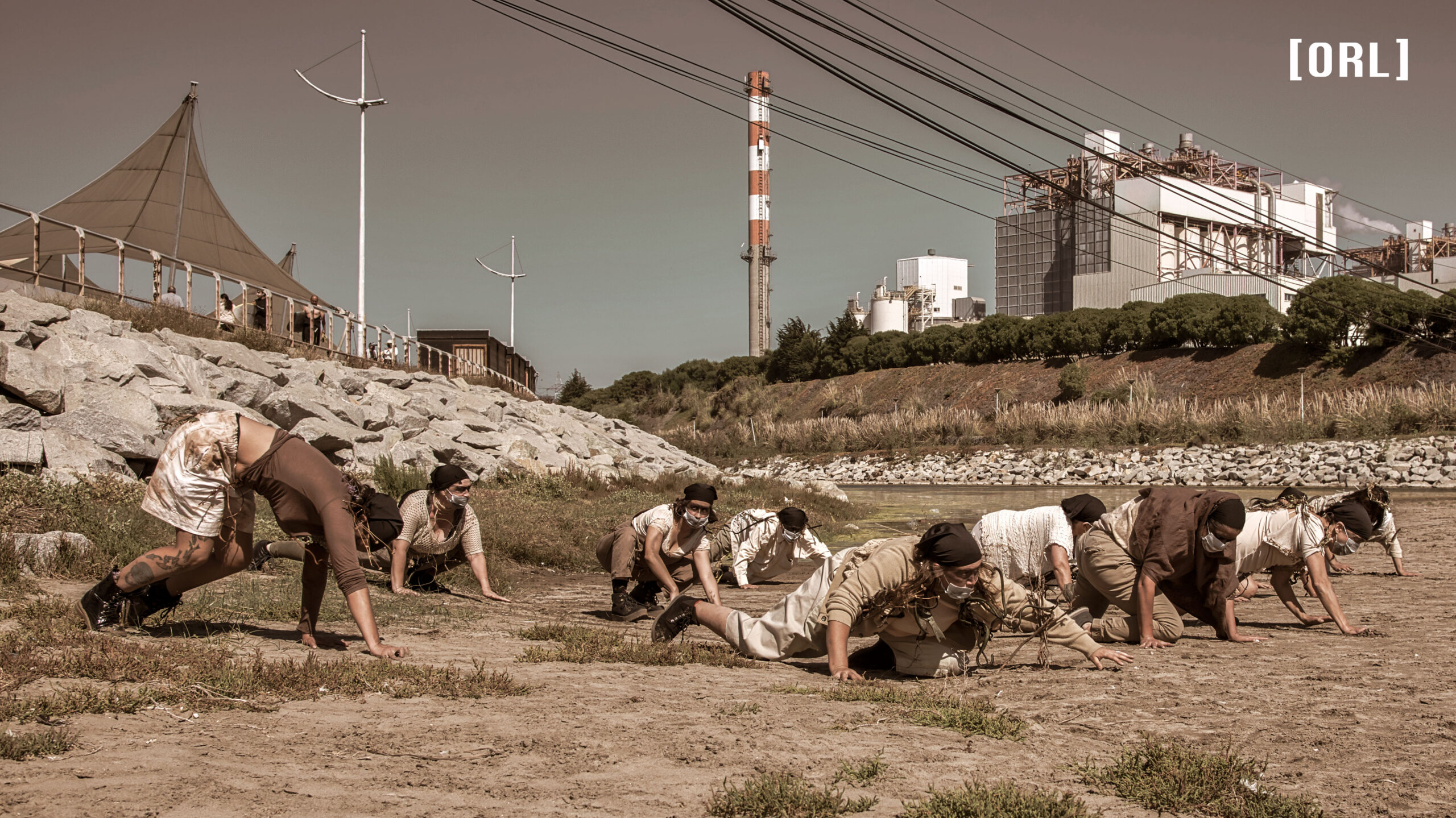By Teresa Sanz
Through a poetic intervention, Teresa presents Under-ground Ore, a documentary of a collective street theatre piece by activists and artists resisting industrial pollution in Quintero-Puchuncaví, Chile.
In Chile in the summer of 2022, two very different landscapes are on fire at the same time within less than 200km. Two zones are screaming. Two red dots light up on the map. Like a castaway throws a flare into the sky for help, fire highlights the disorder, the imbalance, and the need for change.
On the one hand, the Ventanas industrial zone’s transport belt burns. This industrial zone is labelled as a “sacrifice zone” (Espinoza, 2016) where at least 15 industries operate without any environmental regulation, resulting in severe environmental, health, and social impacts. On the other hand, the Kan-Kan natural park is on fire, one of the last habitats of the Chilean palm tree. This natural reserve has seen encroachment over the last decade due to increasing predatory urban and real estate developments.
We all know that fire was here before us. Fire was here before them too, before the real estate companies, before the industries. Fire is the agent of renewal for native forests. But today, fire means death, devastation, and disaster. Today, fire shouts that this cannot go on.
Quintero-Puchuncaví Sacrifice Zone
This is not the first time that smoke covers the town of Ventanas. Smoke has inhabited the counties of Ventanas, Quintero, and other towns in the area since the 1980’s. Since the industries arrived on a ship called Extractivism, a promise of prosperity turned out to be merely smoke. Smoke coming out of iron pipes. The smoke of arsenic, sulphur, copper, lead, mercury, and other pollutants. A cloud of smoke has covered Ventanas since the 80’s. A cloud that is freer than the people. Freer than the fishermen that lost their trade. Freer than the child that lost their street games. Freer than the farmer that lost their harvest. A toxic cloud that is freer than the industrial worker who died with a body rendered green.
Two years ago, on the 25th February 2021, in front of Ventanas beach, the laboratory “Under-ground Ore: street intervention in the face of socio-environmental devastation in the Quintero-Puchuncaví sacrifice zone” was launched. A street intervention in front of the polluting industries. Fifteen neighbours from the area arrived that day. Like many others who have arrived many times before. Like many others who coloured the streets with murals and drawings. Like many others who sang in the street to the rhythm of drums, and those who joined the marches. Under the smoke, a change is also being conjured up, a small space-time of utopia and community, a creative force that reclaims the sea, the sky, and the streets. If only for a second. A second that opens a door to a new and different world without smoke.
I organised the laboratory together with my colleagues from the street theatre collective “Teatro en movimiento callejerx”. “What is it like to live here?” I asked the neighbours at the beginning of the session. “I feel sorrow, anger, abandonment, lack of transparency from the institutions that allow the violation of human rights such as the right to clean air and water” and “this territory used to be an orchard with a lot of richness and biodiversity. Everything has changed and has become grey since the arrival of the industries” they answered. The laboratory and action “En-tierra mineral” (Under-ground ore in English) was then an exploration of the interaction between emotions, body, movement, and the degraded landscape: What effects does the industrial environment have on day-to-day life? How do bodies that have been continuously exposed to pollution relate to the four basic elements of nature—fire, earth, water, and air? The result of the laboratory was the short film “Under-ground Ore”: an experience and manifesto on how to reconcile, interact and recover a territory where fire means coal and oil, earth means ashes and drought, water means pollution and death, and air means unbreathable toxic smoke.

Source: Orl Rival, 2020

Souce: Orl Rival, 2020
Manifesto
(translated from the manifesto collectively written and read during the action)
Let us look around us, what do we see? We see the devastation of a once fertile land. We see disease, we see death everywhere. We see the hundreds of people who are not here.
Today, we stand here, without clean air, smelling the insatiable stench of capital. Caressing the land that has been cultivated for years- Look! Look! This is just wreckage, broken pieces. I see the history of all the lands of the world… I see the dispossession of all the lands here Ventanas Puchuncaví!
What are the ugly iron bars and the artifice progress for? My mouth is dry and sour from shouting at these iron bars. There is no more time. Today, we stay here: in Ventanas Puchuncaví. For the green body of my grandfather, for the green body of my neighbour.
Today is yesterday: because those so-called “men in green” existed. Today is yesterday, and that tremendous mountain of ash does not let us see the sea!
14 industries are classified as dangerous and polluting: Codelco, Puerto Ventanas, GNL Quintero, AES Gener, Cemento Melon, Oxiquim, ENEL, among many others. They offer us a disturbing cocktail of pollutants: arsenic, copper, lead, mercury…
There is no more time. Today is tomorrow: we rise up, attack, and resist as before. We are going to flourish the land of our ancestors. We will avenge the death of our comrades. We curse all those who are behind extractivism. Death is the passing of oblivion, and oblivion can never be a symptom in those who resist. we will continue recovering the life that belongs to us, to give it back to those who understood that the land is not a property: it is not a commodity… The land caresses us and whispers in our ears that this cannot go on.
For Alejandro Castro, Macarena Valdés, Berta Caceres, Santiago Maldonado. And for Emilia Bausis, murdered two days ago in Panguipulli at the hands of large landowners and Real estate expansion in Wallmapu.
Link to the short film: https://youtube.com/watch?v=6uNUliVm9Dk&feature=shares
You can read the author’s research paper on artistic practices in the sacrifice zone here: Sanz, T., Rodríguez-Labajos, B. (2022). Arts, place, and sacrifice zones: restoration of damaged relational values in a Chilean sacrifice zone. Sustain Sci https://doi.org/10.1007/s11625-022-01252-6
——–
Teresa Sanz is a PhD candidate and artist working with activist art linked to socio-environmental conflicts.
References
Espinoza L (2016) Derrame de petróleo en la bahía de Quintero: Asegurando la gobernabilidad sobre una zona de sacrificio. Estudios Sociales Contemporáneos 15:161–180.
Featured image: Orl Rival, 2020.






